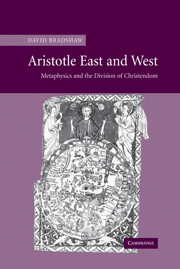Book contents
- Frontmatter
- Contents
- Preface
- 1 The Aristotelian beginnings
- 2 The Prime Mover
- 3 Between Aristotle and Plotinus
- 4 Plotinus and the theory of two acts
- 5 The Plotinian heritage in the West
- 6 Gods, demons, and theurgy
- 7 The formation of the eastern tradition
- 8 The flowering of the eastern tradition
- 9 Palamas and Aquinas
- 10 Epilogue
- Bibliography
- Index
Preface
Published online by Cambridge University Press: 22 September 2009
- Frontmatter
- Contents
- Preface
- 1 The Aristotelian beginnings
- 2 The Prime Mover
- 3 Between Aristotle and Plotinus
- 4 Plotinus and the theory of two acts
- 5 The Plotinian heritage in the West
- 6 Gods, demons, and theurgy
- 7 The formation of the eastern tradition
- 8 The flowering of the eastern tradition
- 9 Palamas and Aquinas
- 10 Epilogue
- Bibliography
- Index
Summary
What has Athens to do with Jerusalem? That is a question that no student of western culture can avoid. Tertullian, who first posed it, did so in the course of accusing philosophy of engendering heresy. The implication behind his question was that Athens and Jerusalem are two different worlds, and therefore categories deriving from Greek thought should have no place within the Christian faith. Yet even Tertullian found it impossible in practice to maintain such a strict division. The Church as a whole tended instead to follow the lead of the Greek apologists, who had drawn freely on Greek philosophy in interpreting the Christian message. Ultimately the many forms of Christian thought that vied for pre-eminence throughout the Middle Ages and Renaissance, and into the early modern era, almost invariably owed much to both of Tertullian's opposing worlds. The result is that Athens and Jerusalem have been deeply and inextricably intertwined in the formation of western culture.
This fusion gives to Tertullian's question a different and more alarming meaning. Viewed in light of the intervening history, the question is not simply whether Christian theology should make use of Greek philosophy; it is whether the two great sources of our civilization are compatible. To hold that they are not is necessarily to put into question, not only at least one of them (and perhaps both), but also the civilization that grew out of their union.
- Type
- Chapter
- Information
- Aristotle East and WestMetaphysics and the Division of Christendom, pp. ix - xivPublisher: Cambridge University PressPrint publication year: 2004



